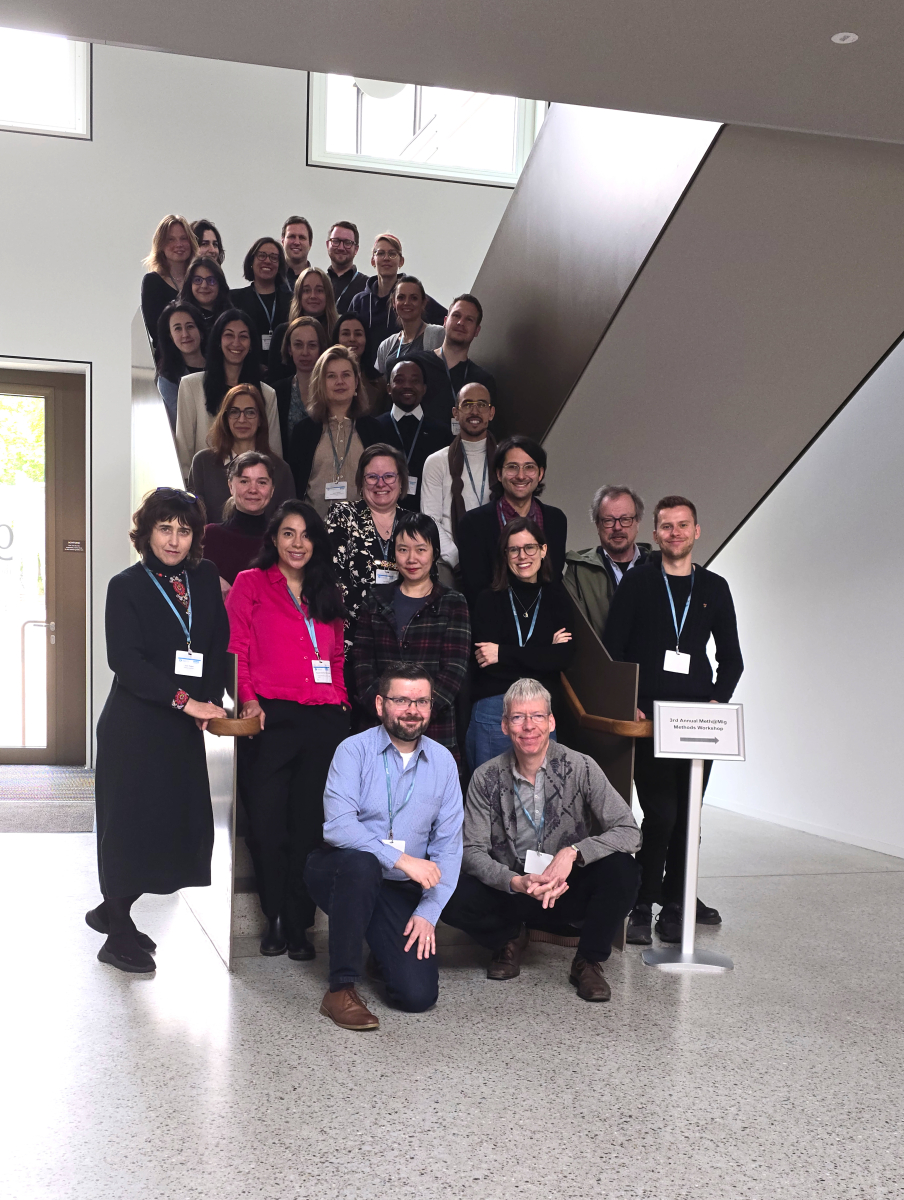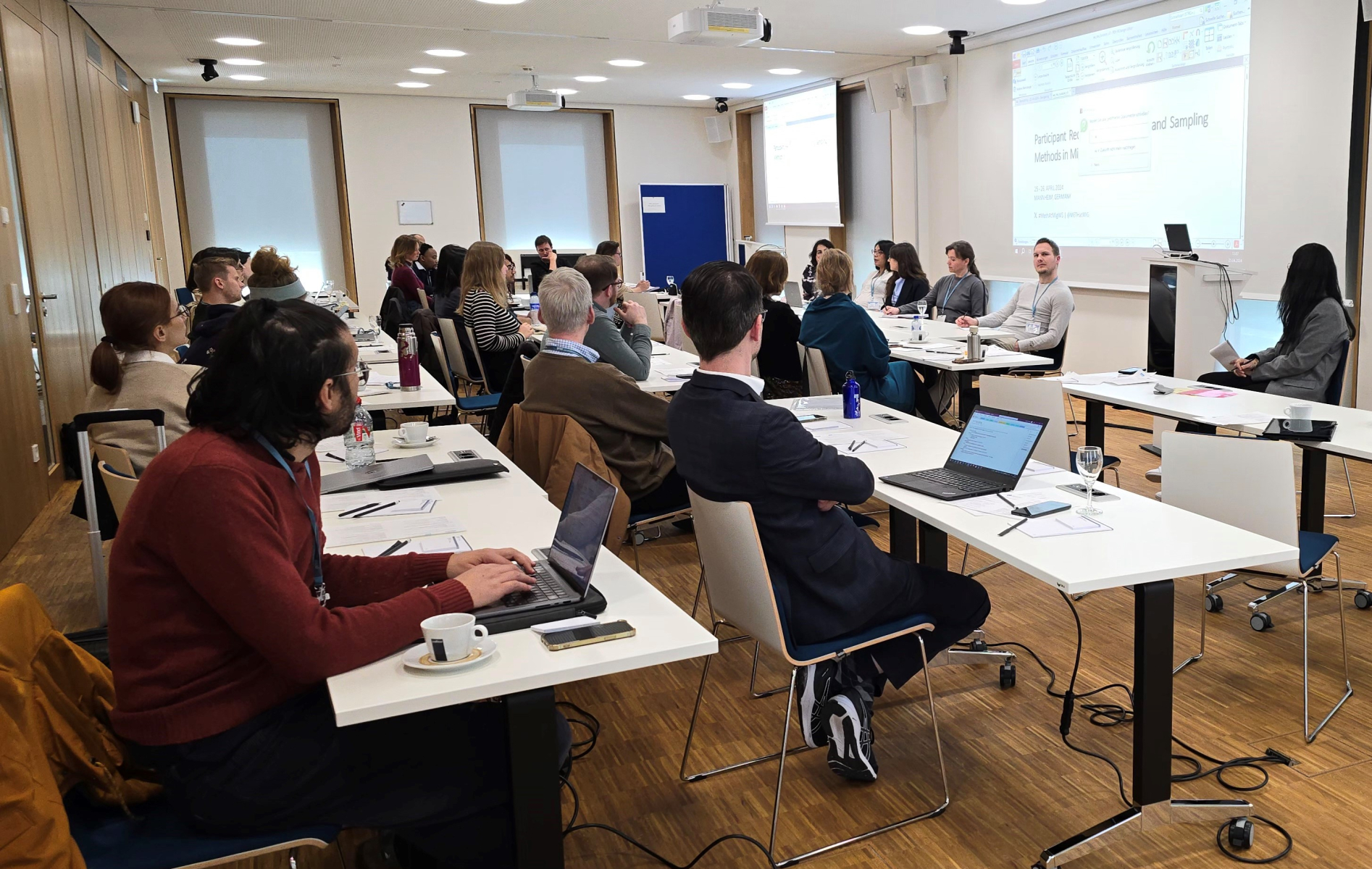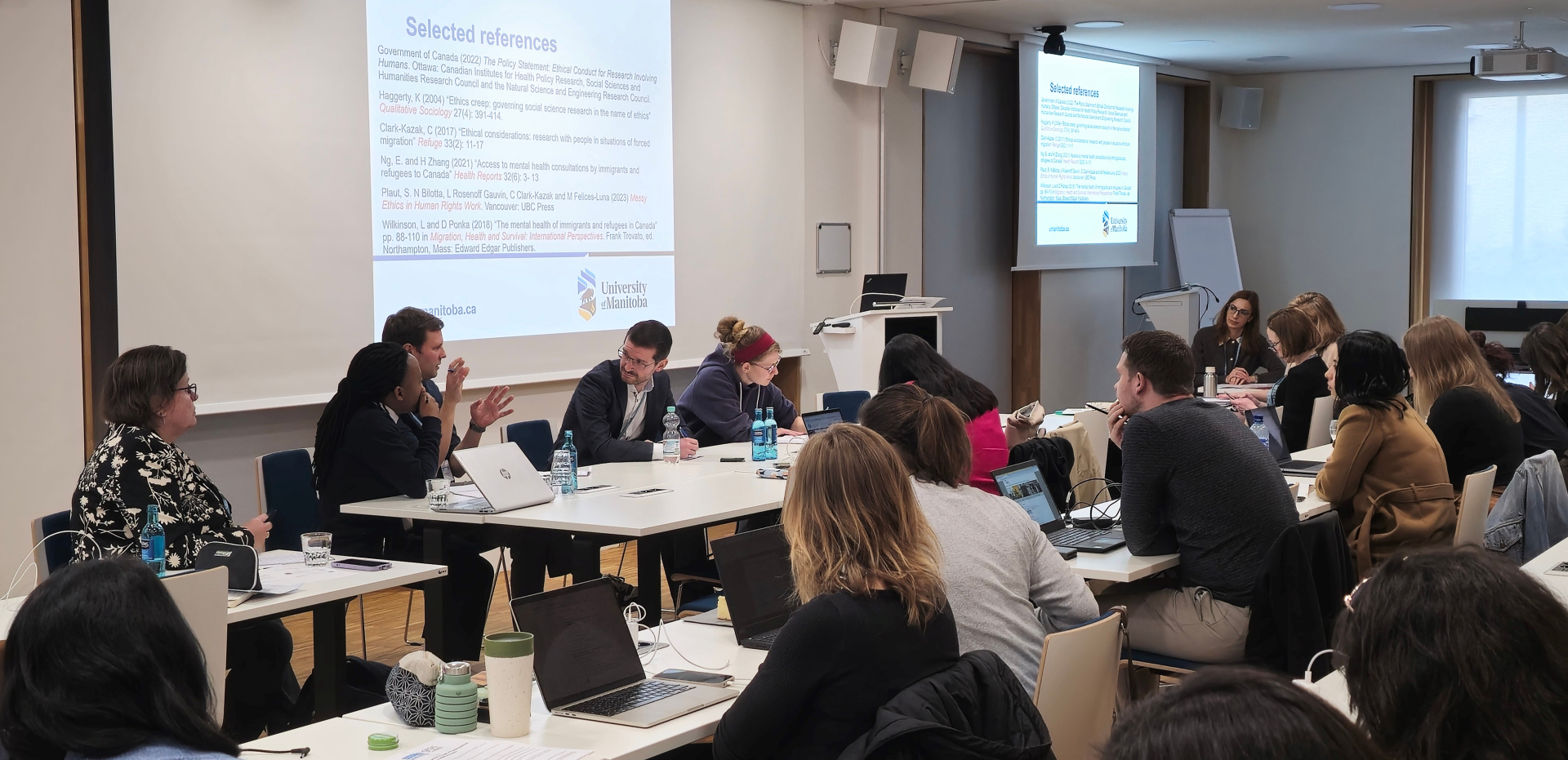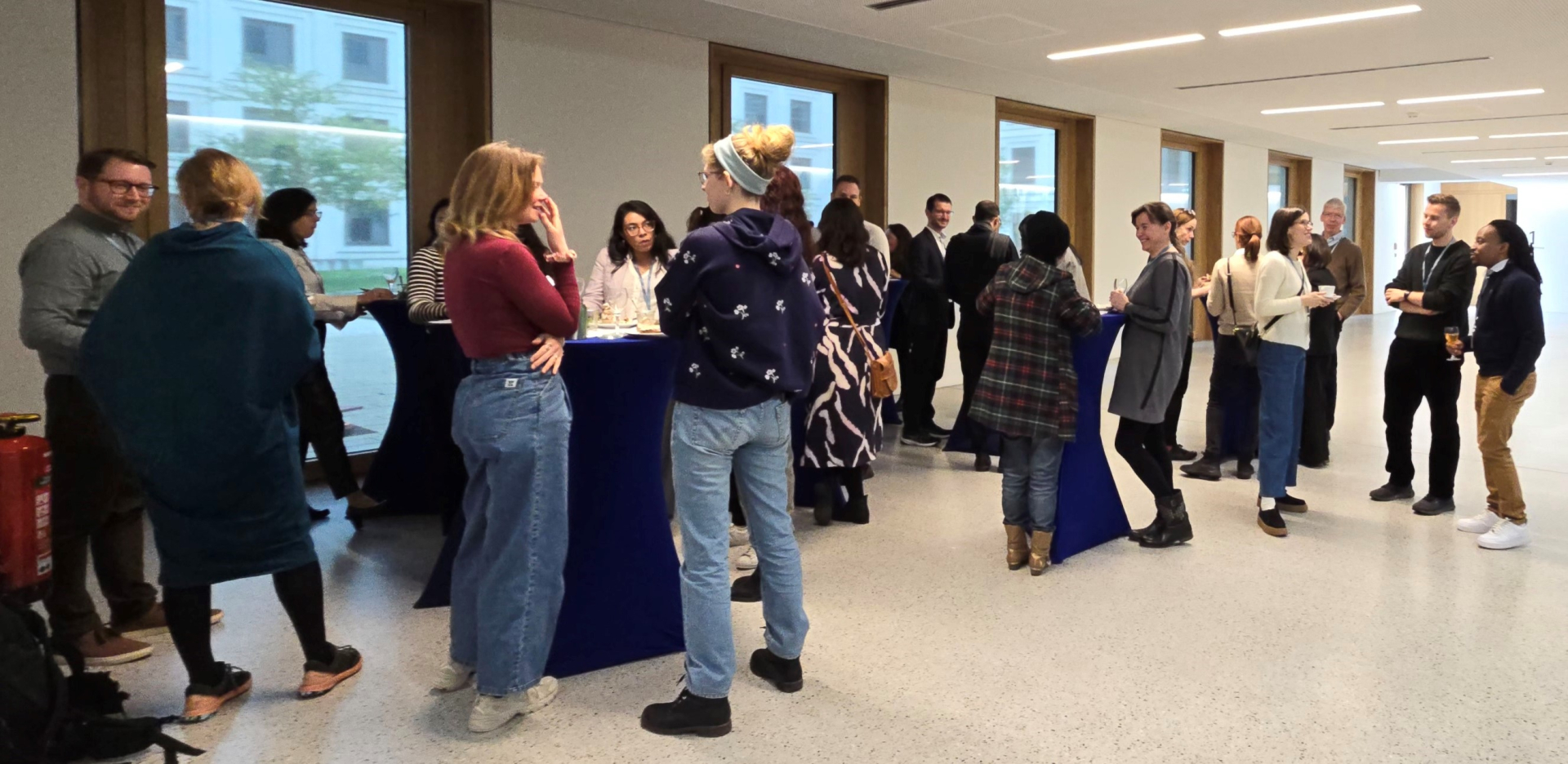Besides serving as a melting pot with residents from 170 nations and 43 percent of its population having a migration background, Mannheim was also the host city for migration researchers from all around the world on April 25-26, 2024. Having recently participated in the 3rd Annual Meth@Mig Workshop on Participant Recruitment Strategies and Sampling Methods in Migration Research hosted by the GESIS - Leibniz Institute for the Social Sciences, I find myself deeply inspired by the wealth of insights and discussions shared during the event.

Workshop participants and organizers
As a freshly enrolled student in the doctoral program, I found the topics discussed in the seminar very valuable. Beyond merely academic enrichment, it was also a great opportunity to engage with professionals working in the field. Each session of the workshop unveiled unique challenges and innovative strategies employed by researchers in diverse contexts which I will be touching upon briefly in the next sections of this blog post.
One of the most striking aspects of the workshop was its acknowledgment of the inherent challenges in studying migrant populations. Recruiting participants for research purposes is a challenging task. There are no definitive rules or universally applicable recipes for do’s and don’ts that would succeed in all situations. It is a topic where one should be flexible and be able to think of different scenarios for reaching out to the ‘hard-to-reach population’. Therefore, as important as it is to talk about success stories, it is also very important to talk about the failures and to learn from them. The workshop shed light on the multifaceted nature of participant recruitment in migration research. It emphasized the critical role this step plays in shaping the overall research process and its outcomes.
Before delving into the content of the workshop, I would like to outline its structure to provide a complete picture. It was organized in four sessions with five scholars in each session. Each scholar had 5-7 minutes to present their work, which goes without saying is a challenging task to accomplish considering the depth and complexity of their topics. Input contributions were followed by a group discussion that allowed interaction among presenters and participants. Despite the time constraints, the presentations were concise and insightful, fostering a rich exchange of ideas. The fast-paced format facilitated dynamic discussions and offered the added benefit of allowing many scholars to showcase their work.
The two-day workshop started with the keynote speech by Aneta Piekut, touching on important points of being a migration researcher. In her talk, titled “Navigating between the ‘invisible’ and the ‘representative’ in migration research: participant recruitment and knowledge production,” she drew reflections based on her previous work, highlighting the tension between producing representative research and including marginalized voices. Her talk got me thinking about how I can position myself in the future as a migration researcher who is also a migrant, a topic that was also touched upon in the following Q&A session.
As a migrant researching migrants, one can bring a unique perspective shaped by personal experiences of migration. This can offer valuable insights and empathy when exploring the challenges, aspirations, and contributions of migrant communities. At the same time, it can present its own set of challenges. To my understanding, being a migrant researching migrants is not just about academic inquiry but also about advocacy, empowerment, and social change. It involves amplifying the voices of marginalized communities, challenging stereotypes, and advocating for policies that promote inclusivity and justice.

Concentrated work …
The workshop’s first session focussed on recruiting respondents with specific profiles, including school children in East Germany, Muslim, and non-Muslim students, forcefully displaced Ukrainians, Turkey-origin immigrants who are Arabic or Kurdish language speakers living in Germany, and rejected asylum seekers from West Africa. Together, these presentations showcased diverse and innovative methodologies in migration and integration research, emphasizing the importance of tailoring outreach strategies to match the audience.
The second session focused on recruiting respondents characterized by specific circumstances, such as tomato traders, irregular migrants, victimized migrant women, and unaccompanied refugee minors living in shelters. All contributions emphasized the importance of being physically present and maintaining direct contact while conducting the research. Through these approaches, researchers can capture nuanced perspectives and diverse experiences effectively.
The third session of the workshop, which opened the second day of the event, was dedicated to inclusive recruitment. Each contribution was focused on different methods of extending the participant base. From building trust with migrant communities to leveraging digital platforms for recruitment, each presentation showcases creative approaches tailored to the unique needs of their study populations. Especially in the case of non-probabilistic methods, social media allows for organic outreach through community engagement, where researchers or mediators foster relationships with their audience through content creation, interactive discussions, and direct outreach. By establishing credibility, fostering a sense of community, and encouraging word-of-mouth sharing, organizations can attract participants who resonate with their values and mission.
The final session was on a variety of topics starting with the usage of multi-language questionnaires to fraud detection in data and finally to ethics in migration studies. What struck me most about the last session was the topic of ethics, ethics approval processes, and how to navigate the challenges associated with this process for both sides (i.e., researchers and board members). It was very interesting to see how this system works differently in Canada compared to European countries, and the discussions revolving around the topic. Realizing how much these rules, ostensibly put in place to protect migrants, actually tie the hands of researchers and how far they can be from reality has made me more aware. Of course, it doesn’t mean everything would be better without them. Throughout

… and lively discussion during sessions.
history, there have unfortunately been numerous examples of experiments in social sciences conducted on human subjects where their rights and well-being were violated, but I still believe there should be a dialogue between researchers and ethics committees, and that this predetermined set of rules should be open to discussion.
To my surprise, there weren’t many discussions at the workshop focused on probabilistic sampling and representativeness. However, several presenters shared their experiences and efforts to achieve a representative sample. I found this inspiring, as it showcased creative approaches to establishing a framework in a field characterized by significant unknowns and uncertainty. Yet, the challenge of duality loomed large — the delicate balance between representativeness and inclusivity. This tension highlights the difficulty in simultaneously ensuring that samples accurately reflect populations while also being inclusive of diverse perspectives and voices. It underscores the importance of employing mixed methods, where quantitative and qualitative approaches complement each other, offering a more comprehensive understanding of complex phenomena.
My final takeaway from the workshop is about cultural assets. In the context of migration studies, cultural knowledge is not just a theoretical asset—it’s a practical necessity. It enables researchers and practitioners to navigate the complexities of migration and working with migrants with nuance, empathy, and effectiveness. Attempting to conduct research on migration as an outsider, without adequate cultural insight, can lead to significant limitations and biases. Migrant communities often have deeply ingrained cultural practices, social norms, and historical contexts that shape their experiences and responses to migration. Without insider knowledge, researchers risk misinterpreting or oversimplifying these dynamics, leading to inaccurate conclusions and potentially harmful interventions.

Socializing and continuing conversations during the coffee break.
[(C) pictures Steffen Pötzschke]
Moreover, attempting to impose an outsider’s belief system or research agenda onto migrant communities can undermine trust and collaboration. It may overlook important issues or priorities that are meaningful to the community but unrecognized by the outsider researcher. This approach fails to recognize the agency and expertise of migrant communities in shaping their narratives and solutions.
Incorporating insider perspectives into migration studies is not just a matter of academic rigor — it’s a matter of ethical practice and social justice. It ensures that research is conducted in a way that respects the dignity, autonomy, and diversity of migrant communities. By valuing and integrating insider knowledge, researchers can foster more meaningful engagement, produce more nuanced insights, and ultimately contribute to more effective and equitable policies and interventions in migration.
The final session was followed by a wrap-up session conducted by Steffen Pötzschke and Agata Górny. So as such, I should wrap up my blog post by thanking the organizers one more time for their planning and organization of the workshop. Another round of thanks goes to the presenters and fellow participants. What truly made the workshop a rewarding experience was the opportunity to engage with scholars from diverse backgrounds. The exchange of ideas and experiences fostered a rich learning environment, allowing us to gain fresh perspectives and insights into research practices.
I am grateful for the opportunity to be a part of this enriching experience and look forward to applying the knowledge and insights gained from the workshop to my future research.
The workshop booklet can be downloaded here.

